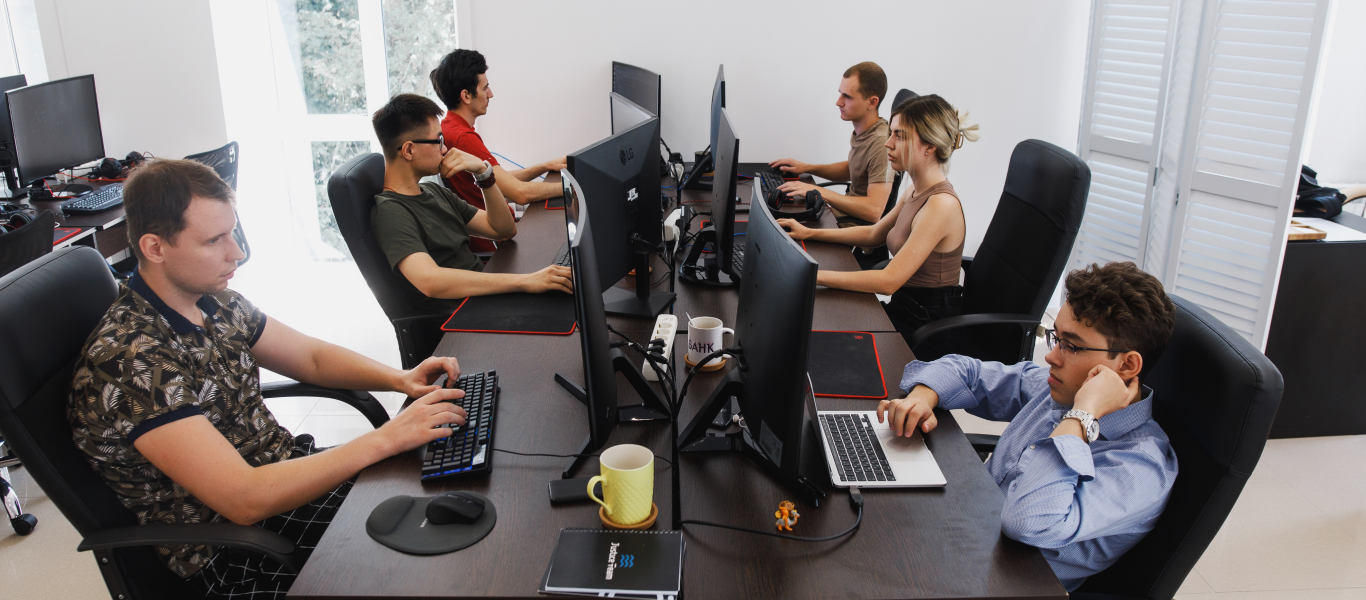Select a language

Interview with COO Justice Team IT
Interview with COO Justice Team IT
1. Tell us what exactly do you do in the company? My main task is to ensure that all the processes that are introduced and that already exist in the company work smoothly and bring maximum benefit. Therefore, I have a large block of organizational work. Also, my attention is paid to the directions of the current and future development of the company: determining in which direction we want to develop, what and how to do this. The rest of the processes are quite small and typical for any manager: finding and making decisions in emergency situations, thinking through strategies, etc
2. What do you like best about your job?
Generate new ideas! I always smile when people ask me what I do in my free time: “What free time? What are you about?". But in my personal time, I always think about some work-related processes: what and how to improve, what to supplement, what needs to be eliminated. Usually, it is at these moments that a muse comes to me and ideas are accidentally born in my head, about which you then think “well, why didn't I do this before ?!”. By far this proactive process is my favorite at work.
3. What principles / values do you follow in your work? How did you come to them? I'll start right away with the second question. Nobody taught me anything. I came to all my working principles and values thanks to my experience. All my work from the first day was connected with people, with employees, with establishing communication. Of course, there were times when I stumbled and did something wrong. But thanks to the analysis of these very situations, I built an understanding of how to behave with employees, and how - not worth it. As for the principles, I believe that it is very important to respond to the loyalty of employees to the company and management with respect, understanding, perhaps even help outside of it. But at the same time, I am convinced that everyone, from management to employees of any level, should play by the same rules and follow a certain set of company principles. You cannot infringe on someone and prohibit something, but for someone at the same moment to make concessions. Everyone should feel like an equal part of a single whole, otherwise it will not work to build a company that can play for a long time.
4. Do you have favorite management tools, models? Perhaps you have your own work? A competent leader is one who, through his own experience and on broken knees, has developed his own management strategy. Therefore, the beloved is his own. Of course, in order to successfully manage a company, you need to understand HR-management, that is, the basics of employee management. There are people who have evoked respect in me at different stages, and to whose advice in the field of management I listened. And here I can talk about Svetlana Ivanova, who has a very useful book “The Art of Recruiting” that can help. Well, and of course, about a person whom I respect very much, Maxim Batyrev. Reading their books, you can learn a lot for yourself, but at the moment of applying these tips and models in practice, in any case, an adaptation will take place specifically for your situation. And this already turns out to be just your own control mechanism.
5. In addition to prof. skills, what qualities should a person have to benefit the company? It would be more correct to say “contribute” to the company and to its development. So, first of all, he must want to do it. There are people - the engines of the process, and there are those who go with the flow. Neither is a bad quality. These are different comfort zones for people. If we are talking specifically about the contribution to development, then a person should be from the first category. Possess creativity, the ability to find a favorable way out even from the most difficult situation. Also, the ability to take responsibility in decision-making plays a significant role. Sometimes this needs to be done immediately, so an increased response is important too.
6. Do you think a higher education is a must for a developer? It is not necessary, like a piece of paper. That is, it doesn't matter whether you studied for some humanitarian specialty or for a technical one closely related to development. But I have a conservative view of education: I am sure that everyone needs it. This is part of the school of life. The university teaches responsibility and some kind of subordination, there is respect for the status and merit of others. Also, at the university you are treated on an equal footing by outstanding teachers who conduct professional scientific and research activities. At such moments, you develop respect for yourself and a desire to conform.
7. What qualities should a person have, who decided to start his way in it? The first is 100% persistence! Because there are people who really have the potential and desire, who retreat at the slightest mistake. But in the world of it, mistakes and failures happen periodically. It is very important not to give up, but to continue doing. The second, as strange as it may sound, is psychological stability. Because there are often situations when you may not be able to fulfill any request of the customer for a long time. At such moments, you need to get together and try to find a solution. Therefore, nerves and psychos are definitely not helpers here. The third is a predisposition to self-education. It is also very important to have a goal and relate it to your capabilities. In any area, without understanding what you want to achieve, it is very difficult. But it is especially felt when a person does not know where he is going. This slows down all processes.
8. What is more logical for a beginner specialist to do: learn and then get a job or get a job, and then teach? If we are talking about the basic things of programming, then a specialist, of course, must own them. Because almost all companies initially offer internships and set certain deadlines. You can be a very cool budding specialist, but you will not be able to complete the internship in time precisely because you will not have enough time to complete the practical task and learn the basic things of programming. Therefore, it is more logical to study the base, and then try yourself in it-companies.
9. Can Taganrog become Silicon Valley? For me, Silicon Valley is a well-tuned business process with a special atmosphere. I do not think that Taganrog and its special entrepreneurial spirit (mainly in sales and construction, but not in it) can be changed. In our city, there is no potential for restructuring business processes that have already existed for years and decades. It is unlikely that our "Radik" will once become "Stanford". It is unlikely that our entrepreneurs will ever begin to think in terms of businessmen from Silicon Valley. But we are already recognized as the it-capital of Russia (laughs). The first brick has already been laid. Let's see what will happen next.
